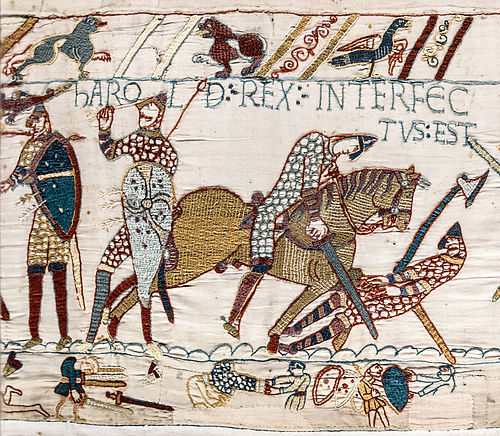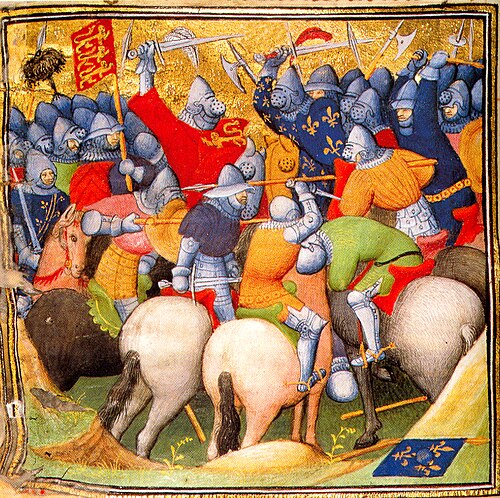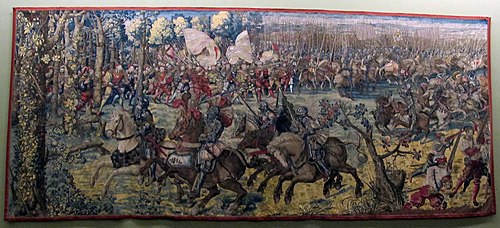Knightnoun
A warrior, especially of the Middle Ages.
Knightnoun
A young servant or follower; a military attendant.
Knightnoun
Nowadays, a person on whom a knighthood has been conferred by a monarch.
Knightnoun
(chess) A chess piece, often in the shape of a horse's head, that is moved two squares in one direction and one at right angles to that direction in a single move, leaping over any intervening pieces.
Knightnoun
A playing card bearing the figure of a knight; the knave or jack.
Knightverb
(transitive) To confer knighthood upon.
Knightverb
To promote (a pawn) to a knight.
Knightnoun
A young servant or follower; a military attendant.
Knightnoun
In feudal times, a man-at-arms serving on horseback and admitted to a certain military rank with special ceremonies, including an oath to protect the distressed, maintain the right, and live a stainless life.
Knightnoun
A piece used in the game of chess, usually bearing a horse's head.
Knightnoun
A playing card bearing the figure of a knight; the knave or jack.
Knightverb
To dub or create (one) a knight; - done in England by the sovereign only, who taps the kneeling candidate with a sword, saying: Rise, Sir --.
Knightnoun
originally a person of noble birth trained to arms and chivalry; today in Great Britain a person honored by the sovereign for personal merit
Knightnoun
a chessman in the shape of a horse's head; can move two squares horizontally and one vertically (or vice versa)
Knightverb
raise (someone) to knighthood;
Knight
A knight is a person granted an honorary title of knighthood by a head of state (including the pope) or representative for service to the monarch, the church or the country, especially in a military capacity.Knighthood finds origins in the Greek hippeis and hoplite (ἱππεῖς) and Roman eques and centurion of classical antiquity.In the Early Middle Ages in Europe, knighthood was conferred upon mounted warriors. During the High Middle Ages, knighthood was considered a class of lower nobility.
Nightnoun
(countable) The period between sunset and sunrise, when a location faces far away from the sun, thus when the sky is dark.
Nightnoun
(countable) An evening or night spent at a particular activity.
Nightnoun
(countable) A night (and part of the days before and after it) spent in a hotel or other accommodation.
Nightnoun
(uncountable) Nightfall.
Nightnoun
(uncountable) Darkness.
Nightnoun
(uncountable) A dark blue colour, midnight blue.
Nightnoun
A night's worth of competitions, generally one game.
Nightverb
To spend a night (in a place), to overnight.
Nightnoun
That part of the natural day when the sun is beneath the horizon, or the time from sunset to sunrise; esp., the time between dusk and dawn, when there is no light of the sun, but only moonlight, starlight, or artificial light.
Nightnoun
Darkness; obscurity; concealment.
Nightnoun
Intellectual and moral darkness; ignorance.
Nightnoun
A lifeless or unenlivened period, as when nature seems to sleep.
Nightnoun
the time after sunset and before sunrise while it is dark outside
Nightnoun
the time between sunset and midnight;
Nightnoun
the period spent sleeping;
Nightnoun
the dark part of the diurnal cycle considered a time unit;
Nightnoun
darkness;
Nightnoun
a shortening of nightfall;
Nightnoun
a period of ignorance or backwardness or gloom
Nightnoun
Roman goddess of night; daughter of Erebus; counterpart of Greek Nyx
Night
Night (also described as night time or night-time or nighttime, unconventionally spelled as nite) is the period of ambient darkness from sunset to sunrise during each 24-hour day, when the Sun is below the horizon. The exact time when night begins and ends depends on the location and varies throughout the year, based on factors such as season and latitude.



























